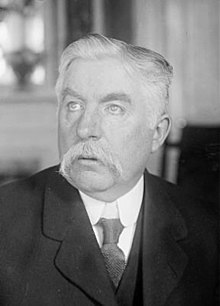Edward Patrick Morris, 1st Baron Morris
|
The Right Honourable The Lord Morris KCMG, PC |
|
|---|---|
 |
|
| 2nd Prime Minister of Newfoundland | |
|
In office March 2, 1909 – December 31, 1917 |
|
| Monarch |
Edward VII George V |
| Governor |
William MacGregor William Horwood (acting) Ralph Champneys Williams Walter Edward Davidson Charles Alexander Harris |
| Preceded by | Robert Bond |
| Succeeded by | John Chalker Crosbie |
| Personal details | |
| Born |
May 8, 1859 St. John's, Newfoundland |
| Died | October 24, 1935 (aged 76) London, United Kingdom |
| Political party | People's Party |
| Profession | Lawyer |
Edward Patrick Morris, 1st Baron Morris, KCMG, PC (May 8, 1859 – October 24, 1935) was a lawyer and Prime Minister of Newfoundland.
Born in St. John's, the son of Edward Morris and Catherine Fitzgerald, he was educated at Saint Bonaventure's College and the University of Ottawa, was admitted to the bar in 1885 and went into practice with his brother Francis. In 1901, he married Isabel Langrishe. Morris was a counsel for the British government during the North American fisheries arbitration in 1910 receiving a knighthood in 1904. Morris served as governor of the Newfoundland Savings Bank from 1889 to 1913 and was elected to the Newfoundland House of Assembly in 1885 as an independent. He joined the Liberal government of Sir William Whiteway as Attorney-General from 1889 to 1895.
Morris was the most senior Roman Catholic politician in Newfoundland and had enormous influence as a result. He had a strained relationship with Whiteway's successor as Liberal leader, Sir Robert Bond, splitting with him to form the Independent Party which he led from 1898 to 1900. Morris formed an alliance with Bond to defeat the Tories and served as minister of justice from 1900 to 1907 in Bond's government. In 1907 he again broke with Bond and formed the People's Party. Both parties tied in the 1908 General Election. Robert Bond was asked to form a government. He refused saying he could not because he could not elect a speaker, without losing a vote and thereby bringing down the government. Morris said he could form a government and was made Prime Minister. He lost a confidence vote and then called an election. He led his party to victory in the 1909 election with a clear majority. He served in that position through the First World War and represented Newfoundland at the Imperial War Conference in London.
...
Wikipedia
